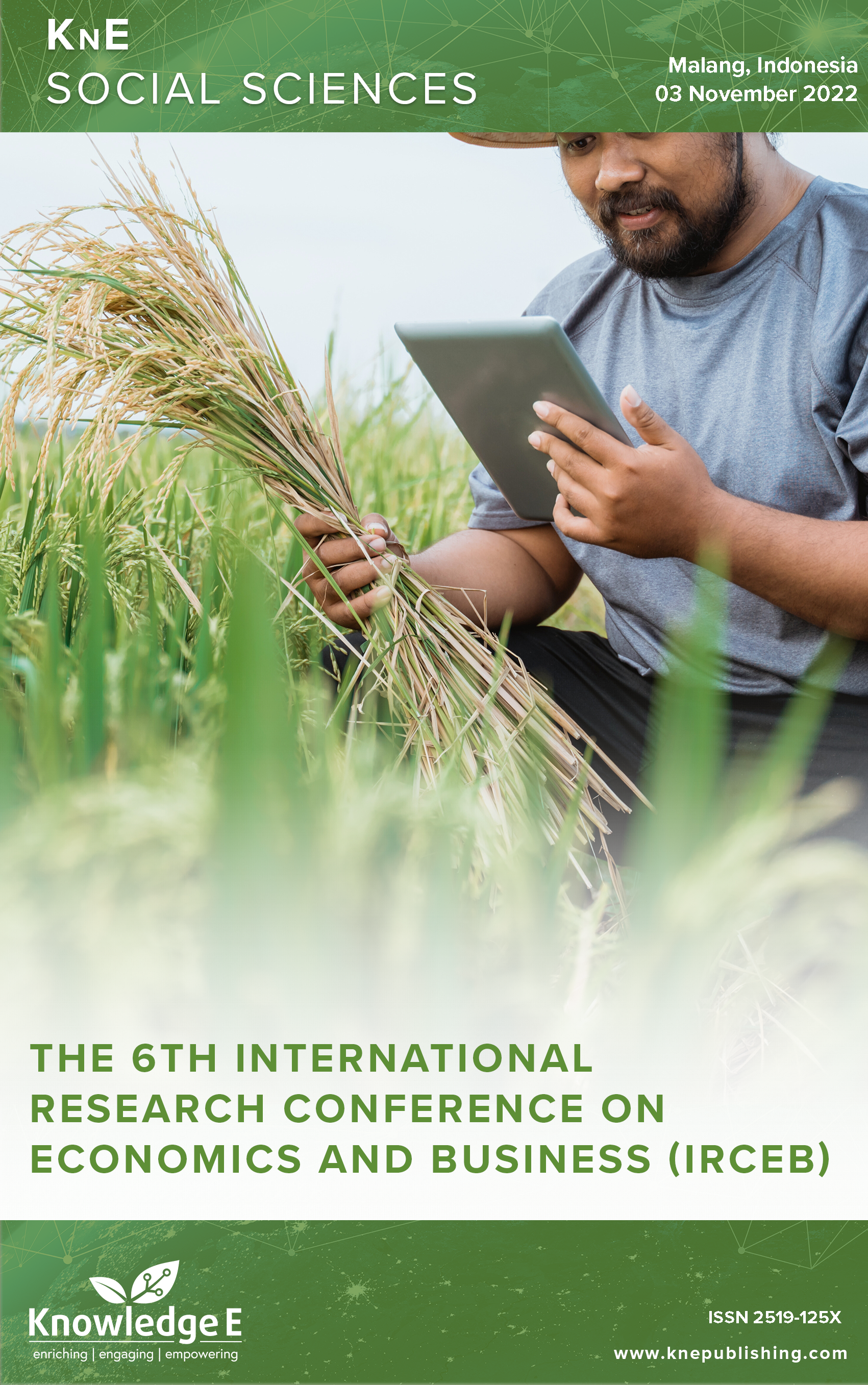Circular Economy Business Model in Integrated Waste Management to Encourage Self-reliance in Jongbiru Village
DOI:
https://doi.org/10.18502/kss.v9i4.15057Abstract
The circular economy has been expected to be an effort to build a competitive and sustainable society. This study aims to develop a circular economy-based business model for waste management in Jongbiru Village, Kediri Regency. The research method used is descriptive-qualitative by developing a sustainable business model innovation framework. The model used is a development of the Business Model Canvas (BMC) by involving business aspects of the environment. The research data were collected through observation and interviews at the location of the research object. The results showed that the waste disposal site (TPS) in Jongbiru Village had implemented a circular economy business with the 3R principle (reduce, reuse, and recycle), which was managed independently. However, there are shortcomings in long-term planning and efforts related to the role of the community. Moreover, the findings in the field also show the potential that needs to be optimized through supporting facilities and social capital. The implications of this research encourage the role of stakeholders in planning the long-term development of business projects with a community engagement approach.
Keywords: village self-reliance, circular economy, social capital, business model canvas
References
Adamowicz M. The potential for innovative and smart rural development in the peripheral regions of Eastern Poland. Agriculture. 2021;11(3):188. DOI: https://doi.org/10.3390/agriculture11030188
Antikainen M, Valkokari K. A framework for sustainable circular business model innovation. Technol Innov Manag Rev. 2016;6(7):5–12. DOI: https://doi.org/10.22215/timreview/1000
Barros MV, Salvador R, do Prado GF, de Francisco AC, Piekarski CM. Circular economy as a driver to sustainable businesses. Cleaner Environmental Systems. 2021;2(October 2020):100006. https://doi.org/10.1016/j.cesys.2020.100006 DOI: https://doi.org/10.1016/j.cesys.2020.100006
Castro-Arce K, Vanclay F. Transformative social innovation for sustainable rural development: An analytical framework to assist community-based initiatives. J Rural Stud. 2020;74(October):45–54. DOI: https://doi.org/10.1016/j.jrurstud.2019.11.010
Corral FJ, Vázquez RM, García JM, Valenciano JP. The circular economy as an axis of agricultural and rural development: The case of the municipality of Almócita (Almería, Spain). Agronomy (Basel). 2022;12(7):1553. DOI: https://doi.org/10.3390/agronomy12071553
Donner M, Gohier R, de Vries H. A new circular business model typology for creating value from agro-waste. Sci Total Environ. 2020 May;716:137065. DOI: https://doi.org/10.1016/j.scitotenv.2020.137065
Gregson N, Crang M, Fuller S, Holmes H. Interrogating the circular economy: The moral economy of resource recovery in the EU. Econ Soc. 2015;44(2):218–243. DOI: https://doi.org/10.1080/03085147.2015.1013353
Hidayah I, Mukhlis I, Yarmawati D. Benefits of community-driven development program to improve livelihood: Case study of Dana Desa (Village Funds) in Indonesia. 12th Economics & Finance Conference. Dubrovnik. 2019;(August):115–127. DOI: https://doi.org/10.20472/EFC.2019.012.009
Jayawati D, Taufik A, Taryana U. Manajemen Rantai Pasok dalam Mendukung Ekonomi Sirkular: Sebuah Literatur Study. Prosiding Seminar Nasional Manajemen Industri Dan Rantai Pasok. 2020;1,85– 94. https://www.jurnal.poltekapp.ac.id/index.php/SNMIP/article/view/788
Khajuria A, Atienza VA, Chavanich S, Henning W, Islam I, Kral U, et al. Accelerating circular economy solutions to achieve the 2030 agenda for sustainable development goals. Circular Economy. 2022;1(1):100001. DOI: https://doi.org/10.1016/j.cec.2022.100001
Kristianto AH, Nadapdap JP. Dinamika Sistem Ekonomi Sirkular Berbasis Masyarakat Metode Causal Loop Diagram Kota Bengkayang. Sebatik. 2021;25(1):59–67. DOI: https://doi.org/10.46984/sebatik.v25i1.1279
Lewandowski M. Designing the business models for circular economy-towards the conceptual framework. Sustainability (Basel). 2016;8(1):43. DOI: https://doi.org/10.3390/su8010043
Marchesi M, Tweed C. Social innovation for a circular economy in social housing. Sustain Cities Soc. 2021;71(February):102925. DOI: https://doi.org/10.1016/j.scs.2021.102925
Marjamaa M, Mäkelä M. Images of the future for a circular economy: The case of Finland. Futures. 2022;141( June):102985. DOI: https://doi.org/10.1016/j.futures.2022.102985
Mukhlis I, Priambodo MP, Suwanan AF, Hidayah I. Establishing an autonomous village through Bumdes (village-owned enterprise) to enhance local economic activity. South Asian Journal of Social Studies and Economics. 2021;12(4):265–273. DOI: https://doi.org/10.9734/sajsse/2021/v12i430333
Nicolosi A, Laganà VR, Di Gregorio D, Privitera D. Social farming in the virtuous system of the circular economy. An exploratory research. Sustainability (Basel). 2021;13(2):1–24. DOI: https://doi.org/10.3390/su13020989
Osterwalder A, Pigneur Y, Tucci CL. Clarifying business models: Origins, present, and future of the concept. Comm Assoc Inform Syst. 2005;16( July): https://doi.org/10.17705/1CAIS.01601 DOI: https://doi.org/10.17705/1CAIS.01601
Padilla-Rivera A, Russo-Garrido S, Merveille N. Addressing the social aspects of a circular economy: A systematic literature review. Sustainability (Basel). 2020;12(19):1– 17. DOI: https://doi.org/10.3390/su12197912
Pearce DW, Turner RK. Economics of natural resources and the environment. The Johns Hopkins University Press; 1990.
Pretty J, Ward H. Social capital and the environment. World Dev. 2001;29(2):209– 227. DOI: https://doi.org/10.1016/S0305-750X(00)00098-X
Robison LJ, Schmid AA, Siles ME. Is social capital really capital? 1999. 99–21.
Sabet NS, Khaksar S. The performance of local government, social capital and participation of villagers in sustainable rural development. Soc Sci J. 2020;00(00):1– 29. DOI: https://doi.org/10.1080/03623319.2020.1782649
Van Der Ploeg JD, Renting H, Brunori G, Knickel K, Mannion J, Marsden T, et al. Rural development: From practices and policies towards theory. Sociol Ruralis. 2000;40(4):391–408. DOI: https://doi.org/10.1111/1467-9523.00156
Yuan J, Lu Y, Ferrier RC, Liu Z, Su H, Meng J, et al. Urbanization, rural development and environmental health in China. Environ Dev. 2018;28:101–110. DOI: https://doi.org/10.1016/j.envdev.2018.10.002

